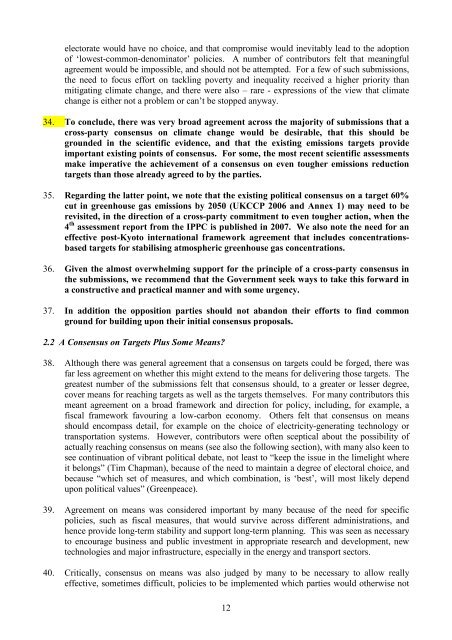All Party Parliamentary Climate Change Group Is a Cross-Party ...
All Party Parliamentary Climate Change Group Is a Cross-Party ...
All Party Parliamentary Climate Change Group Is a Cross-Party ...
Create successful ePaper yourself
Turn your PDF publications into a flip-book with our unique Google optimized e-Paper software.
electorate would have no choice, and that compromise would inevitably lead to the adoption<br />
of ‘lowest-common-denominator’ policies. A number of contributors felt that meaningful<br />
agreement would be impossible, and should not be attempted. For a few of such submissions,<br />
the need to focus effort on tackling poverty and inequality received a higher priority than<br />
mitigating climate change, and there were also – rare - expressions of the view that climate<br />
change is either not a problem or can’t be stopped anyway.<br />
34. To conclude, there was very broad agreement across the majority of submissions that a<br />
cross-party consensus on climate change would be desirable, that this should be<br />
grounded in the scientific evidence, and that the existing emissions targets provide<br />
important existing points of consensus. For some, the most recent scientific assessments<br />
make imperative the achievement of a consensus on even tougher emissions reduction<br />
targets than those already agreed to by the parties.<br />
35. Regarding the latter point, we note that the existing political consensus on a target 60%<br />
cut in greenhouse gas emissions by 2050 (UKCCP 2006 and Annex 1) may need to be<br />
revisited, in the direction of a cross-party commitment to even tougher action, when the<br />
4 th assessment report from the IPPC is published in 2007. We also note the need for an<br />
effective post-Kyoto international framework agreement that includes concentrationsbased<br />
targets for stabilising atmospheric greenhouse gas concentrations.<br />
36. Given the almost overwhelming support for the principle of a cross-party consensus in<br />
the submissions, we recommend that the Government seek ways to take this forward in<br />
a constructive and practical manner and with some urgency.<br />
37. In addition the opposition parties should not abandon their efforts to find common<br />
ground for building upon their initial consensus proposals.<br />
2.2 A Consensus on Targets Plus Some Means?<br />
38. Although there was general agreement that a consensus on targets could be forged, there was<br />
far less agreement on whether this might extend to the means for delivering those targets. The<br />
greatest number of the submissions felt that consensus should, to a greater or lesser degree,<br />
cover means for reaching targets as well as the targets themselves. For many contributors this<br />
meant agreement on a broad framework and direction for policy, including, for example, a<br />
fiscal framework favouring a low-carbon economy. Others felt that consensus on means<br />
should encompass detail, for example on the choice of electricity-generating technology or<br />
transportation systems. However, contributors were often sceptical about the possibility of<br />
actually reaching consensus on means (see also the following section), with many also keen to<br />
see continuation of vibrant political debate, not least to “keep the issue in the limelight where<br />
it belongs” (Tim Chapman), because of the need to maintain a degree of electoral choice, and<br />
because “which set of measures, and which combination, is ‘best’, will most likely depend<br />
upon political values” (Greenpeace).<br />
39. Agreement on means was considered important by many because of the need for specific<br />
policies, such as fiscal measures, that would survive across different administrations, and<br />
hence provide long-term stability and support long-term planning. This was seen as necessary<br />
to encourage business and public investment in appropriate research and development, new<br />
technologies and major infrastructure, especially in the energy and transport sectors.<br />
40. Critically, consensus on means was also judged by many to be necessary to allow really<br />
effective, sometimes difficult, policies to be implemented which parties would otherwise not<br />
12
















